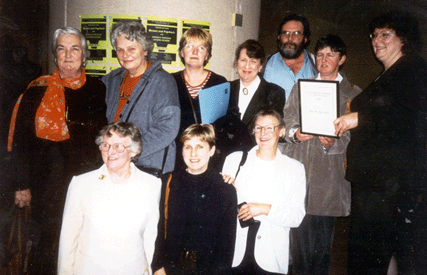Commission WEBSITE: Healthy Community Projects
Rural Health examples
Sage Hill Carers' Service
Sage Hill Carers'
Service provides support for carers of people living with a mental illness
in the Warrnambool area of south-west Victoria.
In 1989 the Association
for the Support of Psychiatric Services (ASPS) was established in Warrnambool
after a public meeting identified the need for a service to support individuals
with a mental illness and their carers. This need was also identified
in a study of carers funded by the National Mental Health Funding Scheme
and carried out by Lowndes and Harrison in 1993. The report also overwhelmingly
identified a desperate need for a specific service to provide support
for carers. In 1994 funding was received, again from the National Mental
Health Funding Scheme, to set up Sage Hill Carers' Service.
Aims
Sage Hill aims to
ensure that carers of people with a mental illness needing support and
assistance are not turned away or referred to another service simply because
their need is deemed "too difficult". Previous attempts to establish similar
services resulted in those services providing direct assistance to the
person with the mental illness, rather than the carer, despite being established
to assist the carer. Sage Hill actually focuses on the needs of the carers
and the carers feel that they can seek meaningful assistance for themselves.
What the Program does
While Sage Hill is
aware of groups like Schizophrenia Fellowship and other groups which provide
support for those with affective disorders like Huntington's chorea and
Alzheimer's disease, these groups generally were metropolitan based with
satellite groups in other centres. They do not provide comprehensive services
for rural carers. Sage Hill works with existing services and groups. Establishing
a group that would specifically cater for the varied needs of carers in
the community is an innovative initiative. The service opened in January
1995 and by 1997 had 145 registered carer-clients. Sage Hill now has almost
650 registered clients.
What makes it successful
Peter McMahon, Coordinator
of Sage Hill, believes the Program is successful because, "it encourages
carer feedback and consults with carers on a regular basis, informally
and formally. An example of this is the Sage Hill Carer Advisory Panel
which is representative of our client group."
Peter adds, "Sage
Hill also attempts to be responsive to carer needs by being flexible and
creative in our responses."

Image:
Brenda Harrison receiving a Schizophrenia Fellowship award at Monash University.
Brenda is pictured here with a group of carers who were involved in the
establishment of Sage Hill and are affectionately referred to as the "Tribal
Elders"
Difficulties encountered
Peter says, "the
transition from Commonwealth funding to state funding was a difficult
process." He adds, "this is probably much to do with the Program's
uniqueness of service, it's difficult to categorise."
Another difficulty
"is the large rural area it services. The geographical isolation compounds
the difficulty of obtaining peer support and supervision, leaving many
to work as sole practitioners."
Funding sources
Initial funding was
received from the National Mental Health Funding Scheme for the first
two years. Recurrent funding is now received from the Department of Human
Services (Victoria).
